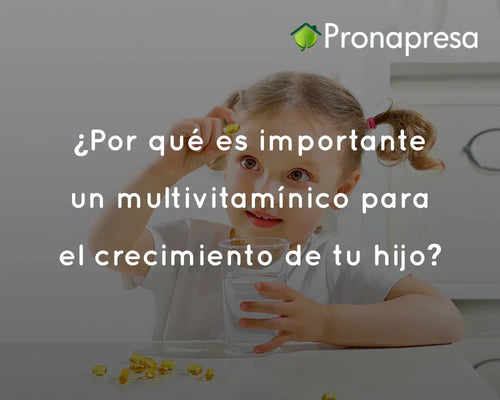
Essential vitamins for healthy growth in children
Childhood growth is a complex process involving numerous factors, including genetics, physical activity, and, above all, proper nutrition. Vitamins are essential micronutrients that help the body perform vital functions such as bone formation, cell regeneration, and strengthening the immune system. Below, we detail the most important vitamins for child development and their benefits.
1. Vitamin A: key to vision and the immune system
Vitamin A is essential for visual health, especially in low-light conditions, and contributes to a stronger immune system, helping to prevent infections. It also supports the development and maintenance of tissues and organs such as the skin and mucous membranes.
- Main sources: Carrots, sweet potatoes, spinach, broccoli, eggs and fortified milk.
- Deficiency: Can cause night vision problems and increase the risk of infections.
2. Vitamin D: for strong bones and teeth
Known as the "sunshine vitamin," vitamin D helps the body absorb calcium and phosphorus, essential minerals for building strong bones and teeth. It's also important for muscle function and the immune system.
- Main sources: Sunlight, fatty fish (such as salmon and sardines), eggs, and fortified milk.
- Deficiency: Can cause rickets, a disease that weakens bones.
3. Vitamin C : immune system booster
Vitamin C is known for its antioxidant properties, which help protect cells from damage. It also improves iron absorption and strengthens the immune system, helping children fight off colds and other common illnesses.
- Main sources: Oranges, strawberries, kiwis, red peppers, broccoli and tomatoes.
- Deficiency: Can lead to fatigue, bleeding gums, and increased susceptibility to infections.
4. Vitamin B complex: energy and cognitive development
B vitamins are essential for converting food into energy, supporting brain development, and maintaining a healthy nervous system. This group includes:
- Vitamin B1 (thiamine): Helps in energy production.
- Vitamin B2 (riboflavin): Promotes tissue growth and repair.
- Vitamin B12: It is key for the formation of red blood cells and neurological development.
- Main sources: Lean meat, chicken, eggs, whole grains, legumes and dairy.
- Deficiency: Can cause fatigue, concentration problems, and developmental delays.
5. Vitamin E: cellular protection and skin health
Vitamin E acts as a powerful antioxidant that protects cells from damage caused by free radicals. It's also essential for healthy skin and hair, and supports the immune system.
- Main sources: Nuts, seeds, spinach, avocado and vegetable oils.
- Deficiency: It is uncommon, but can cause muscle weakness and coordination problems.
6. Vitamin K : coagulation and bone health
Vitamin K is essential for blood clotting and also plays a role in bone health by regulating calcium metabolism.
- Main sources: Spinach, broccoli, kale and soybean oil.
- Deficiency: Can cause excessive bleeding and bone weakness.
How to ensure your child gets the necessary vitamins
1. Choose a balanced diet
The best way to ensure your child receives all essential vitamins is through a varied and balanced diet. Include fruits, vegetables, whole grains, dairy products, and lean protein sources in their daily diet.
2. Consider vitamin supplements when necessary
In some cases, children may need vitamin supplements, especially if they have dietary restrictions or medical conditions that make it difficult to absorb nutrients. Consult with a pediatrician before introducing any supplements.
3. Promote good eating habits from an early age
Involve your child in preparing healthy meals and encourage them to try new flavors. This will help build a positive relationship with food.
4. Limit consumption of processed foods
Ultra-processed foods are often low in essential nutrients and high in sugars and unhealthy fats. Opt for natural snacks like fruit, yogurt, or nuts.
Signs of vitamin deficiency in children
It's important to watch for signs that may indicate a vitamin deficiency in children. Some common signs include:
- Constant fatigue.
- Lack of concentration.
- Dry or irritated skin.
- Weak hair or excessive hair loss.
- Propensity to frequent illnesses.
If you notice any of these symptoms, consult a pediatrician to evaluate your child's nutritional status.
Why are vitamins key to healthy growth?
Vitamins are the fundamental building blocks for a child's overall development. They help strengthen bones, improve brain function, protect the immune system, and ensure optimal growth. Through a balanced diet and proper monitoring, you can ensure your child receives the nutrients they need to grow up healthy and happy.
Ultimately, investing in children's nutritional health is one of the best ways to ensure their present and future well-being. Start today by including more vitamin-rich foods in their diet and foster healthy habits that will last a lifetime!























































